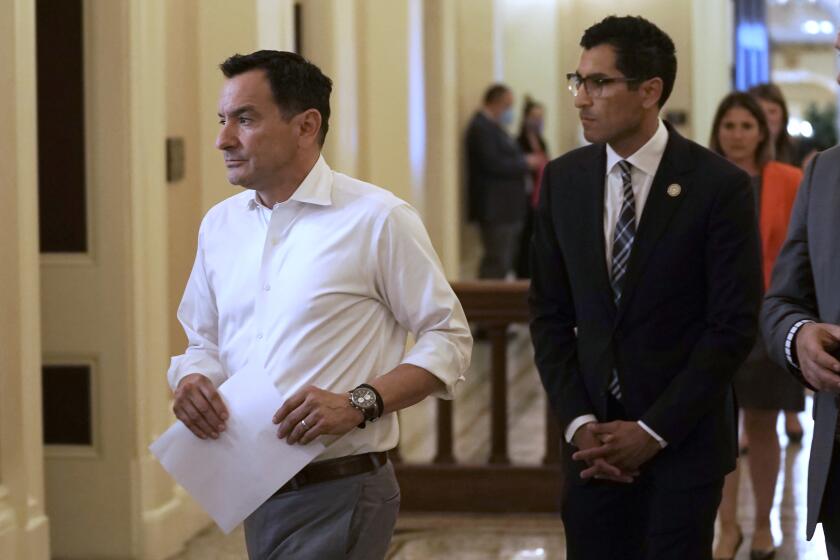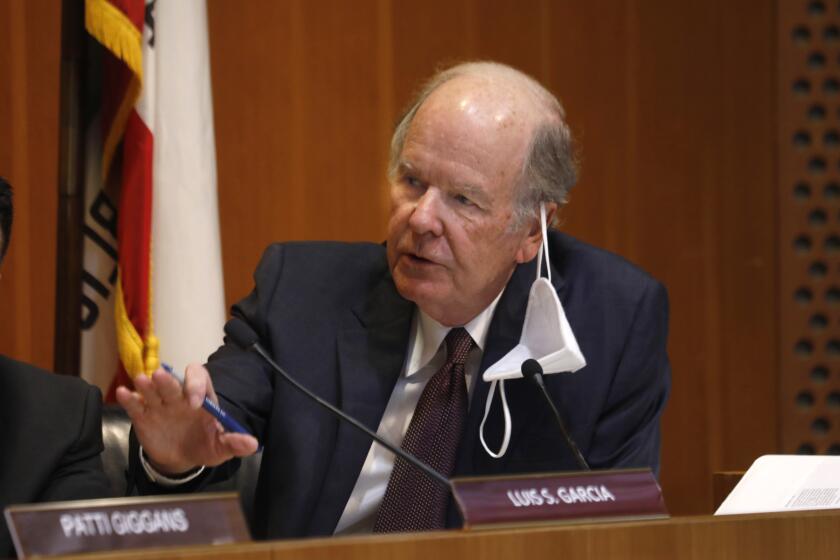Why are lawmakers luring tech lobbyists to wine country before social media, crypto votes?

- Share via
California lawmakers will soon end their summer recess and return to Sacramento for the final, most consequential month of the legislative year. August is when the Legislature determines the fate of hundreds of bills that have been snaking through the Capitol all year, making decisions that may affect millions of Californians as well as many businesses regulated by the state. It’s the month when lobbyists are working hardest to sway lawmakers — and that makes it a ripe time for sleazy politics.
It’s hard to see the upcoming “Technology Policy Summit” as anything other than that. Shortly after business resumes in Sacramento on Aug. 1, select tech lobbyists have been invited by a powerful assemblyman to spend two days schmoozing with lawmakers at a wine country resort in the Napa Valley. Of course, there is a price.
For a $35,000 donation to a foundation affiliated with the Legislature’s “tech caucus” — a bipartisan group helmed by Democratic Assemblymember Evan Low from Silicon Valley — companies can pick a topic they want to brief lawmakers on and designate an executive or lobbyist to moderate the discussion. For $20,000, a donor can speak on a panel, according to a copy of the invitation I obtained. The cheap seats are $10,000 just to attend the two-day event. (Though the invitation does not specify whom donors should pay, I have confirmed that the event is sponsored by the Foundation for California’s Technology and Innovation Economy, which is the nonprofit affiliated with the tech caucus and includes Low’s chief of staff on its board.)
Included in all packages are numerous opportunities to rub shoulders with legislators over meals at the luxurious Carneros Resort and Spa, tucked into the hills overlooking Napa’s bucolic vineyards.
It’s fabulous timing for tech execs to get one-on-one access to California lawmakers (perhaps over a nice Cabernet). For months the tech industry has been trying to kill legislation to regulate social media and cryptocurrency. Lawmakers will cast critical votes later in August that will determine whether these bills pass this year.
California lawmakers should advance legislation to make social media safer for children and keep pressure on Congress to craft a national fix.
Event organizers wouldn’t tell me which companies are paying to send their lobbyists to Napa, nor would they say which lawmakers will be there. Because the money goes to a nonprofit, not a politician’s campaign account, there are no limits on how much the donors can give — and no requirement that the nonprofit report who’s giving. These loose rules have made charitable organizations an appealing way for politicians to raise money outside the bounds of California’s strict campaign finance laws. Politicians basically get a slush fund, while their donors get a tax break.
Nonprofits like the one affiliated with the tech caucus have become increasingly common. An investigation I did for CalMatters in 2020 found at least a dozen nonprofits run by California legislators or caucuses — about four times as many as there were a decade earlier. While they typically underwrite some charitable work, such as scholarships and community events, some of these groups seem to exist mainly to put on events that sell lobbyists access to lawmakers through getaways at swanky hotels and trips overseas. The tech caucus foundation spent about 60% of its revenue in 2019 putting on conferences and about 13% supporting charities, according to its most recent public tax filing.
The foundation’s lawyer, Stephen Kaufman, didn’t answer most of my questions but sent an email saying the money it raises “supports teachers by providing scholarships for them to learn coding that they can then take back and teach in their classrooms.”
California law requires elected officials to publicly disclose when they ask someone to donate $5,000 or more to a nonprofit. But when I investigated lawmakers’ nonprofits, I found that Low had stopped reporting which companies were giving to the tech caucus foundation. It meant that the public was kept in the dark about who’s spending money to influence tech policy in the state pioneering technological advancements that are radically changing people’s lives. As the global leader in tech innovation, California should also be aggressive in regulating the industry in ways that respect the 1st Amendment while limiting the damage caused by platforms that make it easy to incite violence and spread misinformation.
After I reported on the tech caucus foundation, California’s political ethics regulator opened an investigation into Low’s fundraising practices. It’s supposed to determine whether he violated the law that requires disclosing charitable donations given at a politician’s behest. But 2½ years later, the investigation remains open. That’s maddening.
Commentary: A huge shake-up is underway in the California Capitol. Voters, this is your moment
With numerous state lawmakers resigning or running for other offices this year, legislative elections are more competitive than they’ve been in a long time.
While the investigation proceeds at a glacial pace, Low continues raising money and attempting to build power. Last year he reported a handful of donations to the tech caucus foundation made at his request by Facebook, Airbnb, Waymo (a driverless car company) and SunPower, a solar energy business. He also reported donations from Uber, Tesla, Amazon and other companies to a nonprofit affiliated with the Legislature’s LGBTQ caucus that Low heads.
Late last year, Low made a run at becoming Assembly speaker. When it didn’t succeed, he pivoted and helped fellow Assemblyman Robert Rivas (D-Hollister) secure the votes to become the next speaker. That sets him up for a powerful position whenever Rivas takes over.
Meanwhile, Big Tech is trying to kill or weaken bills aimed at making social media safer for kids, stemming the online spread of vaccine misinformation and protecting consumers in the cryptocurrency market. The industry has already succeeded in persuading lawmakers to water down one bill by removing the ability for parents to sue social media companies for harm to children who become addicted to their platforms. Instead, under the latest changes, only prosecutors can sue the companies. Tech lobbyists are working to neuter another bill that would require online services used by children to be designed in “age-appropriate” ways — such as banning location tracking and defaulting social media accounts to the most private settings.
I’d love to know if the lawmakers elected to serve the public will be discussing these issues with tech lobbyists over wine tastings and spa treatments next month. Wouldn’t you?
More to Read
A cure for the common opinion
Get thought-provoking perspectives with our weekly newsletter.
You may occasionally receive promotional content from the Los Angeles Times.












